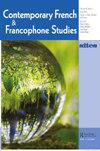马格里布女性电影的演变:《索菲亚的女人》(2018)和《亚当》(2019)
IF 0.2
4区 文学
0 LITERATURE, ROMANCE
引用次数: 0
摘要
本文概述了马格里布的后殖民电影,并重点介绍了两位马格里布电影人,Meryem Benm 'Barek-Alosï和Maryam Touzani,他们的电影对摩洛哥社会中的未婚母亲和非婚生子问题采取了更为大胆的立场。本文通过对索菲亚(2018)和亚当(2019)的详细分析,探讨了摩洛哥Moudawana(家庭法)的发展,对妇女生活的影响,以及马格里布文化中的羞耻概念。本文章由计算机程序翻译,如有差异,请以英文原文为准。
Evolution of Maghrebi Women Cinema: Filles-mères in Sofia (2018) and Adam (2019)
Abstract This article gives an overview of postcolonial cinema in the Maghreb while focusing on the two Maghrebi filmmakers, Meryem Benm’Barek-Alosï and Maryam Touzani, whose films take a more daring stance on the problem of filles-mères (unmarried mothers) and childbearing out of wedlock in the Moroccan society. This article examines the development of Moudawana (family law) in Morocco, its effects on women's lives, and the concept of shame in Maghrebi culture through a detailed analysis of Sofia (2018) and Adam (2019).
求助全文
通过发布文献求助,成功后即可免费获取论文全文。
去求助
来源期刊

Contemporary French and Francophone Studies
LITERATURE, ROMANCE-
CiteScore
0.30
自引率
0.00%
发文量
43
期刊介绍:
An established journal of reference inviting all critical approaches on the latest debates and issues in the field, Contemporary French & Francophone Studies (formerly known as SITES) provides a forum not only for academics, but for novelists, poets, artists, journalists, and filmmakers as well. In addition to its focus on French and Francophone studies, one of the journal"s primary objectives is to reflect the interdisciplinary direction taken by the field and by the humanities and the arts in general. CF&FS is published five times per year, with four issues devoted to particular themes, and a fifth issue, “The Open Issue” welcoming non-thematic contributions.
 求助内容:
求助内容: 应助结果提醒方式:
应助结果提醒方式:


